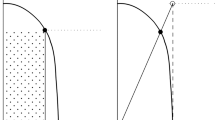Abstract
We consider the fair division of a set of indivisible goods where each agent can receive more than one good, and monetary transfers are allowed. We show that if there are at least three goods to allocate, no efficient solution is population monotonic (PM) on the superadditive Cartesian product preference domain, and the Shapley solution is not PM even on the submodular domain. Moreover, the incompatibility between efficiency and PM prevails in the case of at least four goods on the subadditive Cartesian product domain. We also show that in case there are only two goods to allocate, the Shapley solution and the constrained egalitarian solution are PM on the subadditive preference domain but not on the full preference domain. For the two-good case, we provide a new tool (the hybrid solutions) to construct efficient solutions that are PM on the entire monotone preference domain. The hybrid Shapley solution and the hybrid constrained egalitarian solution are two important examples of such solutions.
Similar content being viewed by others
Notes
We use PM as an abbreviation for both population monotonicity and population monotonic.
\({\varphi }_{i}\left(N, \Omega , u\right)\) is a natural candidate to denote the set of all allocations that \(i\) can get under \(\varphi \left(N, \Omega , u\right)\), which is \({\left\{\left({\sigma }_{i}, {m}_{i}\right)\right\}}_{\left(\sigma , m\right)\in \varphi \left(N, \Omega , u\right)}\). However, since we never refer to this set in this work, we find it convenient to denote \(i\)’s utility by \({\varphi }_{i}\left(N, \Omega , u\right)\) at an essentially single-valued solution \(\varphi\).
The established standard interpretation of the PM principle in the TU game literature is “positive”, requiring that no agent is hurt by the arrival of new agents, contrary to the “negative” interpretation in the fair division literature, as the main focus in the former literature is the environments (e.g., those inducing convex games) with increasing returns to cooperation. This is not the case for the environments inducing concave TU games. Although dPM for TU games and PM for fair division problems are conceptually the same, we choose to call it dPM to avoid the possible confusion resulting from calling two different properties PM in the TU games setting. See Thomson (1995) and Sprumont (2008) for different formulations of the PM principle for a variety of environments.
The argument for the Shapley value is provided in Moulin (1992). Dutta (1990) proved that the Dutta-Ray solution satisfies PM (no one is hurt by the arrival of new agents) on convex games (Lemma 5.5, Dutta 1990). Klijn et al (2001) provided a dual algorithm to compute the dual of this solution which coincides \(CES\left(v\right)\) on \({\Gamma }_{con}\). One can easily adapt the argument in Lemma 5.5 to prove that \(CES\left(v\right)\) satisfies dPM on \({\Gamma }_{con}\) using this dual algorithm.
Moulin (1992) proved that preferences satisfy substitutability if the problem is such that agents can receive at most 1 object, hence preferences over sets of objects are irrelevant. Instead, let all agents have unit demand preferences and allow them to get more than 1 object. Then for any \(\left(N, \Omega , u\right)\), \(v\left(S,\bullet \right)\) will be the same in two different frameworks discussed above for all \(S\).
See Thomson (2007) for a survey on the well-known, technically equivalent, airport (cost sharing) problem.
A TU game solution \(\psi\) meets WCM if for all \(\left(N, v\right),\left(N,{v}^{\prime}\right)\) with \(v\left(S\cup i\right)-v\left(S\right)\le {v}^{\prime}\left(S\cup i\right)-{v}^{\prime}\left(S\right)\) for all \(i\in N\), \(S\subseteq N\); \({\psi }_{i}\left(N,v\right)\le {\psi }_{i}\left(N, {v}^{\prime}\right)\) for all \(i\in N\). Hokari and Gellekom (2002) showed that both solutions satisfy WCM on convex games. It is easy to check that the conclusion is true for the concave games induced by problems in \({\mathcal{E}}_{1}\).
References
Alkan A (1994) Monotonicity and envy-free assignments. Econ Theor 4(4):605–616
Beviá C (1996a) Population monotonicity in a general model with indivisible goods. Econ Lett 50(1):91–97
Beviá C (1996b) Population monotonicity in economies with one indivisible good. Math Soc Sci 32(2):125–137
Chun Y (1986) The solidarity axiom for quasi-linear social choice problems. Soc Choice Welfare 3(4):297–310
Dutta B (1990) The egalitarian solution and the reduced game properties in convex games. Int J Game Theory 19:153–169
Dutta B, Ray D (1989) A concept of egalitarianism under participation constraints. Econometrica 57(3):615–635
Feige U (2009) On maximizing welfare when utility functions are subadditive. SIAM J Comput 39(1):122–142
Hokari T, van Gellekom A (2002) Population monotonicity and consistency in convex games: some logical relations. Int J Game Theory 31:593–607
Kelso AS, Crawford VP (1982) Job matching, coalition formation, and gross substitutes. Econometrica 50(6):1483–1504
Kim H (2004) Population monotonic rules for fair allocation problems. Soc Choice Welfare 23:59–70
Klaus B (2001) Population-monotonicity and separability for economies with single-dipped preferences and the assignment of an indivisible object. Econ Theor 17(3):675–692
Klijn F, Slikker M, Tijs S (2001) A dual egalitarian solution. Econ Bull 10(3):1–8
Moulin H (1990) Fair division under joint ownership: recent results and open problems. Soc Choice Welfare 7(2):149–170
Moulin H (1992) An application of the Shapley value to fair division with money. Econometrica 60(6):1331–1349
Shapley LS (1953) A value for n-person games. In: Tucker A, Kuhn H (eds) Contributions to the theory of games, vol II. Princeton University Press, Princeton, pp 307–317
Sprumont Y (2008) Monotonicity and solidarity axioms in economics and game theory. In: Pattanaik PK, Tadenuma K, Xu Y, Naoki Y (eds) Rational choice and social welfare. Springer, New York, pp 71–94
Thomson W (1983) The fair division of a fixed supply among a growing population. Math Oper Res 8(3):319–326
Thomson W (1995) Population monotonic allocation rules. In: Barnett WA, Moulin H, Salles M, Schofield N (eds) Social choice, welfare, and ethics. Cambridge University Press, Cambridge, pp 79–124
Thomson W (2007) Cost allocation and airport problems. University of Rochester, Mimeo
Acknowledgements
This work is partially completed during my doctoral studies at Rice University under the supervision of Professor Hervé Moulin, and the final version is completed at Higher School of Economics. I thank both institutions for supporting my work. I am also grateful to Hervé Moulin, William Thomson, Fuad Aleskerov, an anonymous associate editor and two anonymous referees for their valuable comments.
Author information
Authors and Affiliations
Corresponding author
Additional information
Publisher's Note
Springer Nature remains neutral with regard to jurisdictional claims in published maps and institutional affiliations.
Rights and permissions
About this article
Cite this article
Doğan, E. Population monotonicity in fair division of multiple indivisible goods. Int J Game Theory 50, 361–376 (2021). https://doi.org/10.1007/s00182-020-00749-7
Accepted:
Published:
Issue Date:
DOI: https://doi.org/10.1007/s00182-020-00749-7




